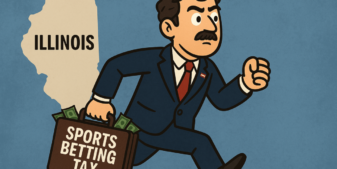Illinois sports betting is set for a big tax hike, and leading sportsbooks called the plan “discriminatory, punitive and constitutionally suspect.”
On Saturday, Illinois lawmakers voted in favor of a tax of $0.25 per wager for the first 20 million bets placed annually by an operator and $0.50 per wager for each additional bet beyond 20 million. This will make the state the first in the US to tax both sports betting handle and gross gaming revenue.
The state already raised taxes last year, implementing a progressive rate that ranges from 20% to 40% on revenue generated by licensed sportsbooks. Previously, the rate had been a flat 15% on revenue, which is fairly standard across the US.
Sports Betting Alliance speaks out against the plans
The Sports Betting Alliance (SBA), a lobby group made up of FanDuel, Fanatics, DraftKings, and BetMGM, voiced its opposition to the proposal.
An SBA spokesperson commented, “With this change, lawmakers are essentially urging customers—and especially these small dollar bettors—to switch to unsafe and unregulated sportsbooks who defy state consumer protections and generate zero taxes for state priorities,”
“These illegal operators are the big winners from Saturday’s vote.”
As the SBA highlights, placing a $0.25 tax on every bet, no matter the amount, could be particularly damaging to small stake wagers. It would effectively make accepting $1 bets unprofitable for sportsbooks.
Cost will land with customers
Robert Walker, a former sportsbook executive, told Front Office Sports: “Make no mistake: this cost will ultimately land squarely on the customer.”
Walker went on to add, “The tax may be levied on the operator, but basic economics tells us who really pays. What’s particularly frustrating is how this undermines the competitive position of regulated operators just when they need every advantage they can get against emerging alternatives.”
The hike is expected to hit FanDuel and DraftKings the hardest as the two online sportsbooks dominate the regulated market. In the wake of the news that lawmakers had voted in favor of the proposal, DraftKings shares fell 7%. Flutter, owners of FanDuel, also saw a 2% drop, but the company is more insulated due to its international portfolio of betting companies.
In response to the new tax, it is likely that betting companies will try to recoup some of the lost revenue from users. This could involve raising minimum stakes, decreasing promotions or introducing additional fees for bettors.
As the SBA commented, these measures could drive users away from licensed sportsbooks towards offshore betting sites. Last year, unregulated sports betting sites generated almost $900 million in revenue in Illinois, not far behind the $1.2 billion of regulated sportsbooks.
Illinois seeks $1 billion in extra tax revenue
The new tax is part of plans in the Illinois budget to generate an additional $1 billion to fund public transport. At the current rate, Illinois sports betting contributed $277.5 million in tax revenue in 2024, which was almost double the $150 million generated in 2023 following the change to the progressive tax rate.
Residents in the Prairie State have been progressively betting more each year since the state legalized sports betting in 2020. The below chart shows how betting handle, operator revenue, and tax revenue have increased over the past 3 years:
| Year | Total Handle (USD) | Operator Revenue (USD) | State Tax Revenue (USD) |
|---|---|---|---|
| 2022 | $9.75 billion | $806 million | $122 million |
| 2023 | $11.62 billion | $1.002 billion | $150 million |
| 2024 | $14.01 billion | $1.214 billion | $277.5 million |
Analysts predict that the new tax would have cost sportsbooks an additional $70 million last year.
Illinois Sports Betting Tax Hike Discriminatory, Say Sportsbooks

